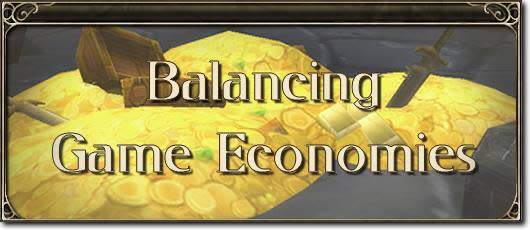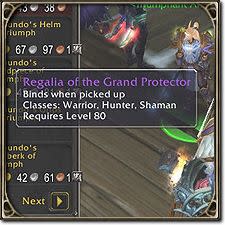MMO Mechanics: Balancing game economies
Most players won't need an economics degree to play an MMO, but strong mechanical forces under the bonnet still guide our actions in our favourite titles. Virtually every financial exchange can be broken down into an effort equals economic gain equation: We put in our hours, and the game economy churns out new gear or money.
Since so many in-game actions financially reward players, MMOs have developed mechanics that attempt to curtail the inflation game economies usually see. Charging your character for goods and services, bind-on-pickup gear, regular destruction of valuable goods, and player-controlled auction house and farming systems all combine to keep the spiralling amount of coppers falling into player hands in check.
In this week's MMO Mechanics, I'm going to look at some ways both sandbox and themepark MMOs automatically rebalance weighted economies by exploring the systems that restrict the free trade of goods and curb players' constant accrual of money. I'll look at how each system functions and how player manipulation adds a new layer of realism to game economies.
The cost of living in the big bad virtual world
One of the most immediately obvious economy-balancing systems starts to affect the player right at the beginning of play since we must pay our way through our virtual adventures in virtually every MMO. Even the best gear cannot stand up to an adventurer's rigorous use indefinitely, so repairs quickly become an inevitability (and in some games, item decay or item loss can require us to purchase new gear entirely). This is often quite a small cost, but if your gear gets banged up beyond recognition before you decide to let a blacksmith see to it, the bill will be much more substantial. Players must then skim some of the money received in their risky exploits from the top of their purses each time they venture out. The heftiness of repair costs was a particularly sore point in the first punishing incarnation of Final Fantasy XIV, in which repairing high-end gear could cost more than leves would bring in.
Navigating the wondrous worlds laid out at our characters' feet is another costly affair: Flight systems charge by distance, mounts (and vehicles and ships) have an inherent value, and learning how to use mounts of differing rarity or speed will cost our characters yet more again. Since exploring the MMO world is so necessary, developers can be assured that a substantial amount of money will be given back to NPCs in the form of travelling costs and so will be taken out of the game economy.
Consumables exist in almost every major MMO, and again these items are an excellent way to prevent a spiralling game economy. These items are important for maintaining economic balance since they disappear on use, meaning developers can be guaranteed that players must repeatedly purchase these consumables. The benefits of using consumable items make the cost worthwhile, and many raid teams enforce pre-battle potion fortification to maximise success. Much like throwing money at NPCs for services, purchasing consumables from NPCs is a good way to take regular chunks of gold from players and stave off inflation, and purchasing consumables from other players ultimately removes resources from the world.
Destruction and real-world solutions
In sandbox games like EVE Online, destroying the hard-earned goods of the playerbase is par for the course. Ships worth billions of ISK are destroyed in a typical territorial battle and taken out of the game entirely. This removes a large amount of materials from the game economy, keeping the demand for those materials high and the manufacturing industries profitable. Supply and demand regulation is a vital balancing measure in sandbox games, since player autonomy is key to their success.
Insurance acts as a safety net in this destruction-heavy system, cushioning the impact of losing the materials on the individual player. A proportion of the cost of the ship can be reclaimed through insurance, which makes players more readily accept the seemingly harsh destruction of their hard-earned equipment. The actual ship loss means less to players than you might think, since every ship loss can be boiled down to simple economic risk. The insurance cash flood into the game economy is also partially mitigated by the ship costing more than the insurance payout, since players will have to pay to cover the deficit if they want the same equipment back again.
EVE's economic system mirrors the real world so closely that CCP even hired an economist to keep track of pricing and advise the company of necessary drop rate adjustments. Players have pulled off massive scams without formal punishment and even built their own financial institutions and investment schemes.
Soulbound gear
Soulbound equipment might be the bane of our character-gearing existence, but it plays a vital role in the economic balance of themepark games centered on raiding and gear acquisition. Most gear that binds on equip is the best gear available, so demand for those pieces is rampant. However, these pieces are the reward for hard work and are usually drops from high-end raiding bosses. If raiders could gain the best gear available without any effort, endgame content would very quickly become meaningless. Working hard to be the best they can be is what keeps some raiders playing!
If raid gear in themeparks were not soulbound, it could become commonplace as fewer drops would be wasted on a group that doesn't need that particular item. Pieces without a use for those who earned them would find their way into the hands of those who had not jumped over the endgame effort hurdles. This could become problematic for game economies since gear prices would crash right across the board if all the best pieces were marketed off in the auction house. Players would be less inclined to spend money on anything less than the best gear for their slots, making crafted items useless in many situations.
Auction houses and the farming we do to fill them
Auction houses are a major activity hub in many MMOs, facilitating the transactions of hundreds or thousands of players simultaneously. Open, traceable trading allows players to directly influence the supply and demand chain that governs the game economy. In World of Warcraft's case, addons that improve the auction house interface or include advice about current market price are widely available, allowing individual players to further refine their buying or selling patterns.
Players keep the auction house in check without much awareness of the fact. When we refuse to buy goods that are overpriced, list our abundant resources for a bargain to make a quick sale, or deliberately undercut the competition by one copper to make our listing more attractive, we are actively influencing the trade value of the items we exchange. Developers use farming for materials as a gateway for players to directly influence the supply of goods. When the price of farmable materials is increased by demand, players notice the increased profit margins for their farming time and increase their efforts, hoping to make some quick cash. However, when multiple farmers react to the price increase in a similar manner, goods start flooding the market again and prices naturally decrease as demand is met.
Auction house systems usually charge for listings, so money is filtered into the coffers of NPCs much in the same way as if items were bought from vendors. Players might certainly make a profit from buying and selling at the right time, but a cut of the money changing hands will disappear from the game economy to balance this out.
Developers employ many strategies to keep their game economies balanced, and I think the strongest of these mechanics are found in player-led economies like EVE Online's. Most game economy balancing is not hurtful to the individual character's pocket, but when the financial skimming is considered in the context of the entire playerbase, it becomes much easier to see the impact that consistently taking a few coppers out of the game will have on controlling the economy.
MMO virtual economies, as incomplete and imperfect as they might be, can teach us a lot about the real-world economic climate and the consequences of manipulating those systems. EVE players, for instance, have pulled off some huge banking scams that mirror those that have occurred in the real world. I can see great scope for future economists to use sandbox MMOs to test new theories without real-world risk, and I'm sure exciting upcoming titles like EverQuest Next, Star Citizen, and Elite: Dangerous will give us even more food for thought.

MMOs are composed of many moving parts, but Massively's Tina Lauro is willing to risk industrial injury so that you can enjoy her mechanical musings. Her column, MMO Mechanics, explores the various workings behind our beloved MMOs every Wednesday.







